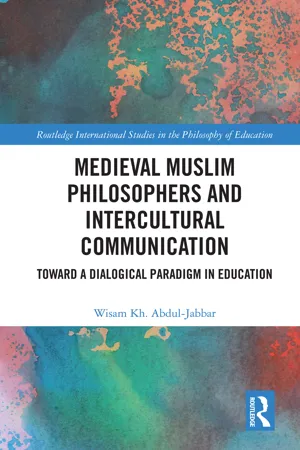
Medieval Muslim Philosophers and Intercultural Communication
Towards a Dialogical Paradigm in Education
- 200 pages
- English
- ePUB (mobile friendly)
- Available on iOS & Android
Medieval Muslim Philosophers and Intercultural Communication
Towards a Dialogical Paradigm in Education
About This Book
This book examines the works of Medieval Muslim philosophers interested in intercultural encounters and how receptive Islam is to foreign thought, to serve as a dialogical model, grounded in intercultural communications, for Islamic and Arabic education. The philosophers studied in this project were instructors, tutors, or teachers, such as Al-Kindi, Al-Farabi, Al-Ghazali, and Averroes, whose philosophical contributions directly or indirectly advanced intercultural learning.
The book describes and provides examples of how each of these philosophers engaged with intercultural encounters, and asks how their philosophies can contribute to infusing intercultural ethics and practices into curriculum theorizing. First, it explores selected works of medieval Muslim philosophers from an intercultural perspective to formulate a dialogical paradigm that informs and enriches Muslim education. Second, it frames intercultural education as a catalyst to guide Muslim communities' interactions and identity construction, encouraging flexibility, tolerance, deliberation, and plurality. Third, it bridges the gap between medieval tradition and modern thought by promoting interdisciplinary connections and redrawing intercultural boundaries outside disciplinary limits. This study demonstrates that the dialogical domain that guides intercultural contact becomes a curriculum-oriented structure with Al-Kindi, a tripartite pedagogical model with Al-F?r?b?, a sojourner experience with Al-Ghazali, and a deliberative pedagogy of alternatives with Averroes. Therefore, the book speaks to readers interested in the potential of dialogue in education, intercultural communication, and Islamic thought research.
Crucially bridging the gap between medieval tradition and modern thought by promoting interdisciplinary connections and redrawing intercultural boundaries outside disciplinary limits, it will speak to readers interested in the dialogue between education, intercultural communication, and Islamic thought.
.
Frequently asked questions
Information
Table of contents
- Cover
- Half Title
- Series
- Title
- Copyright
- Contents
- Preface
- Acknowledgments
- 1 The Intercultural, Educational, and Interdisciplinary Borderlines
- 2 Intercultural Encounters, Discord, and Discovery: Medieval Times Amid Evil Times?
- 3 The Dialogical Paradigm: A Paradigm for the Intercultural Context
- 4 Al-Kindi on Education: Curriculum Theorizing and the Intercultural Minhaj
- 5 Intercultural Fārābism: Toward a Tripartite Model of Dialogical Education
- 6 Rihla as the Sojourner’s Deliverer From Error: Al-Ghazali’s Interdisciplinary and Intercultural Journey of Epistemic Crisis
- 7 The Averroesian Deliberative Pedagogy of Intercultural Education
- Concluding Thoughts and Implications
- Index